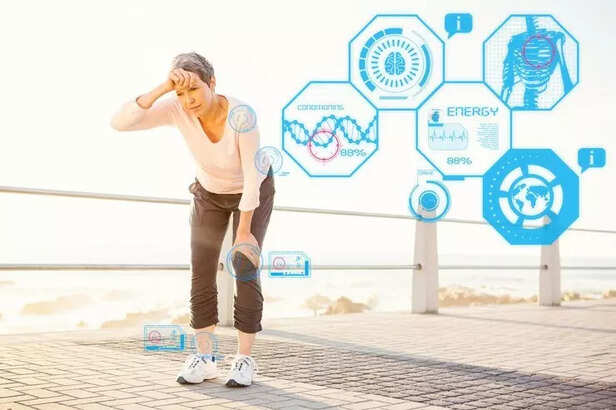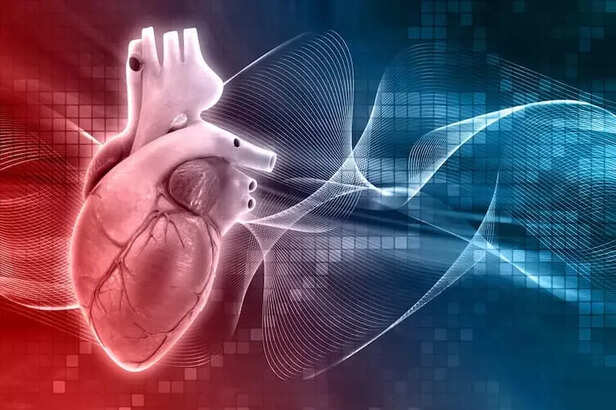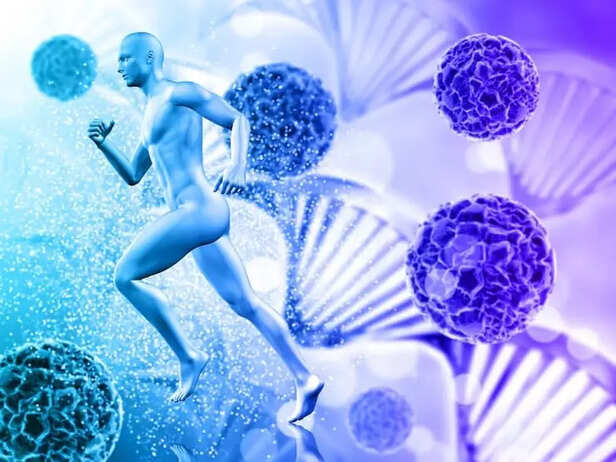What Happens When You Spend 365 Days Floating Above Earth? Science Has the Answers
Prem Kamde | Mon, 09 Jun 2025
Spending a full year orbiting Earth isn’t just an extraordinary adventure — it’s a profound experiment on the limits of the human body. In the weightless void of space, astronauts face dramatic changes: muscles weaken without gravity’s pull, bones lose density at alarming rates, and fluid shifts cause swollen faces and pressure on the brain. But the effects go deeper — from altered vision and compromised immune systems to shifts in gene expression and even changes in the heart’s size and function. After 365 days in orbit, science reveals a remarkable story of resilience, vulnerability, and adaptation, offering critical insights not only for future space exploration but for understanding human health back on Earth.
( Image credit : Freepik )
Photo:
Imagine spending an entire year floating in space, orbiting the Earth at 17,500 miles per hour, completely weightless. Sounds like a dream, right? But what does that actually do to your body? What happens when you live without gravity for 365 days straight? Today, let’s dive into the incredible, sometimes strange, and truly mind-blowing effects that space has on the human body.
First off, gravity is something we take for granted every day. It keeps our feet on the ground, helps our blood flow, and even keeps our bones strong. When astronauts leave Earth, they enter a microgravity environment where none of these “normal” things happen the same way. This change sets off a chain reaction inside the body.

One of the biggest challenges astronauts face is muscle and bone loss. Here on Earth, your muscles are constantly working just to keep you upright and moving against gravity. In space? That workload disappears. Without resistance, muscles begin to weaken and shrink—a process called muscle atrophy. Imagine not using your leg muscles for a year—this is similar.
Bones, too, start to lose density. Normally, the constant pressure of gravity forces your bones to stay strong and dense. But in space, bones begin to release calcium into the bloodstream because they’re not “needed” as much. This calcium loss can lead to brittle bones, similar to osteoporosis on Earth. The good news? Astronauts have special exercise routines on the International Space Station (ISS) to fight this, but even then, some loss is inevitable.

Have you seen pictures of astronauts with those famously puffy, swollen faces? That’s due to fluid shifting upward in their bodies. On Earth, gravity pulls fluids down toward your legs, but in space, the fluids redistribute, filling the head and chest. This increased pressure can cause headaches and even affect vision over time.
In fact, many astronauts report changes in eyesight after long missions—a condition called Spaceflight-Associated Neuro-ocular Syndrome (SANS). The fluid pressure can flatten the eyeball and affect the optic nerve, leading to blurred vision. Scientists are still studying this to find ways to prevent it, especially since future missions to Mars could last even longer.

Your heart is a muscle too, and it also reacts to life in microgravity. Without the need to pump blood against gravity, the heart actually gets a little smaller and can become less strong. Interestingly, the heart doesn’t just shrink randomly—it adjusts to the new environment by pumping blood more efficiently in zero-G. But this can cause issues when astronauts return to Earth’s gravity, making simple tasks like standing up feel dizzy or exhausting.

One of the more surprising discoveries is how space affects the immune system. Studies have shown that after long missions, astronauts’ immune responses can be weaker, making them more susceptible to infections. Also, space radiation—cosmic rays that bombard spacecraft—can damage DNA and increase cancer risk. The protective atmosphere of Earth is missing up there, so astronauts have to be extra careful.
On the genetic level, recent research shows that space travel can actually change gene expression, turning certain genes on or off in response to the environment. It’s like the body is rewriting its own instructions to adapt to space. Scientists are only beginning to understand what this means for long-term health.
Mental Health: The Psychological Challenge

It’s not just the body that changes—being isolated, confined, and far from home for a whole year impacts mental health, too. Astronauts face loneliness, stress, and the pressure of living in a tiny metal tube with limited contact. Maintaining psychological well-being is just as critical as physical health, and space agencies now put a big emphasis on support, communication, and routines to keep astronauts’ minds strong.

So why does all this matter? For starters, understanding these effects is crucial for planning future deep-space missions to the Moon, Mars, or beyond. If humans are going to explore the solar system, we need to find ways to protect their bodies and minds over months and years in space.
Unlock insightful tips and inspiration on personal growth, productivity, and well-being. Stay motivated and updated with the latest at My Life XP.
First off, gravity is something we take for granted every day. It keeps our feet on the ground, helps our blood flow, and even keeps our bones strong. When astronauts leave Earth, they enter a microgravity environment where none of these “normal” things happen the same way. This change sets off a chain reaction inside the body.
Muscle and Bone Loss: Your Body’s Weightless Warning

Muscle and Bone Loss
( Image credit : Freepik )
One of the biggest challenges astronauts face is muscle and bone loss. Here on Earth, your muscles are constantly working just to keep you upright and moving against gravity. In space? That workload disappears. Without resistance, muscles begin to weaken and shrink—a process called muscle atrophy. Imagine not using your leg muscles for a year—this is similar.
Bones, too, start to lose density. Normally, the constant pressure of gravity forces your bones to stay strong and dense. But in space, bones begin to release calcium into the bloodstream because they’re not “needed” as much. This calcium loss can lead to brittle bones, similar to osteoporosis on Earth. The good news? Astronauts have special exercise routines on the International Space Station (ISS) to fight this, but even then, some loss is inevitable.
Fluid Shift: Why Astronauts Have Puffy Faces and Headaches

Puffy Faces and Headaches
( Image credit : Freepik )
Have you seen pictures of astronauts with those famously puffy, swollen faces? That’s due to fluid shifting upward in their bodies. On Earth, gravity pulls fluids down toward your legs, but in space, the fluids redistribute, filling the head and chest. This increased pressure can cause headaches and even affect vision over time.
In fact, many astronauts report changes in eyesight after long missions—a condition called Spaceflight-Associated Neuro-ocular Syndrome (SANS). The fluid pressure can flatten the eyeball and affect the optic nerve, leading to blurred vision. Scientists are still studying this to find ways to prevent it, especially since future missions to Mars could last even longer.
The Heart: Changing Shape and Function

The Heart: Changing Shape and Function
( Image credit : Freepik )
Your heart is a muscle too, and it also reacts to life in microgravity. Without the need to pump blood against gravity, the heart actually gets a little smaller and can become less strong. Interestingly, the heart doesn’t just shrink randomly—it adjusts to the new environment by pumping blood more efficiently in zero-G. But this can cause issues when astronauts return to Earth’s gravity, making simple tasks like standing up feel dizzy or exhausting.
Immune System and DNA: Space’s Hidden Effects

Immune System and DNA
( Image credit : Freepik )
One of the more surprising discoveries is how space affects the immune system. Studies have shown that after long missions, astronauts’ immune responses can be weaker, making them more susceptible to infections. Also, space radiation—cosmic rays that bombard spacecraft—can damage DNA and increase cancer risk. The protective atmosphere of Earth is missing up there, so astronauts have to be extra careful.
On the genetic level, recent research shows that space travel can actually change gene expression, turning certain genes on or off in response to the environment. It’s like the body is rewriting its own instructions to adapt to space. Scientists are only beginning to understand what this means for long-term health.
Mental Health: The Psychological Challenge

The Psychological Challenge
( Image credit : Freepik )
It’s not just the body that changes—being isolated, confined, and far from home for a whole year impacts mental health, too. Astronauts face loneliness, stress, and the pressure of living in a tiny metal tube with limited contact. Maintaining psychological well-being is just as critical as physical health, and space agencies now put a big emphasis on support, communication, and routines to keep astronauts’ minds strong.
What This Means for the Future

Future
( Image credit : Freepik )
So why does all this matter? For starters, understanding these effects is crucial for planning future deep-space missions to the Moon, Mars, or beyond. If humans are going to explore the solar system, we need to find ways to protect their bodies and minds over months and years in space.
Unlock insightful tips and inspiration on personal growth, productivity, and well-being. Stay motivated and updated with the latest at My Life XP.
Frequently asked questions (FAQs)
- What effect does being in space have on our sleep?The quality and timing of sleep can be affected due to the different light-dark cycles in space.
- Do astronauts receive any physical therapy other than exercise in space?Yes, astronauts are also given stretching and specialized massage techniques to keep muscles and joints healthy.
- How is mental stress managed during space travel?Astronauts are given methods such as psychological counseling, regular communication with family, and meditation to reduce stress.
- Is there any effect on fertility or reproduction after staying in space for a year? Research is still underway on this, but it is not yet confirmed whether long-term space travel has a permanent effect on fertility.
- What kind of medical innovations will be needed to spend more time in space in the future?Advanced radiation shielding, muscle and bone regeneration therapies, and mental health support systems will be needed.










